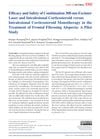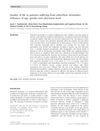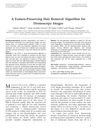 1 citations,
April 2020 in “Journal of The American Academy of Dermatology”
1 citations,
April 2020 in “Journal of The American Academy of Dermatology” 5ARI treatment improves hair growth in older men with minimal side effects.
 1 citations,
July 1997 in “Inpharma Weekly”
1 citations,
July 1997 in “Inpharma Weekly” Finasteride improves hair growth and satisfaction in men with male pattern baldness but may cause sexual side effects.

New treatments for skin conditions show promise, especially Coacillium® for hair growth in young people with alopecia areata.
 November 2023 in “Deleted Journal”
November 2023 in “Deleted Journal” Combining laser and corticosteroid is not better than corticosteroid alone for treating frontal fibrosing alopecia.
 August 2016 in “Journal of Investigative Dermatology”
August 2016 in “Journal of Investigative Dermatology” Dutasteride improved hair density and thickness in men not helped by finasteride, with minimal side effects.
 August 2016 in “Journal of Investigative Dermatology”
August 2016 in “Journal of Investigative Dermatology” Some men don't respond to common hair loss treatments, but a new inhibitor, FOL-005, shows promise for targeting unwanted hair growth.
 August 2016 in “Journal of Investigative Dermatology”
August 2016 in “Journal of Investigative Dermatology”  August 2016 in “Journal of Investigative Dermatology”
August 2016 in “Journal of Investigative Dermatology”  August 2016 in “Journal of Investigative Dermatology”
August 2016 in “Journal of Investigative Dermatology”  269 citations,
August 2002 in “Journal of The American Academy of Dermatology”
269 citations,
August 2002 in “Journal of The American Academy of Dermatology” 5% minoxidil works better for hair growth and density, with minor irritation.
 254 citations,
September 2014 in “Menopause”
254 citations,
September 2014 in “Menopause” The NAMS 2014 recommendations guide healthcare providers on treating health issues in midlife women, emphasizing individualized care and informed decision-making.
 239 citations,
November 2000 in “Journal of The American Academy of Dermatology”
239 citations,
November 2000 in “Journal of The American Academy of Dermatology” Finasteride doesn't effectively treat hair loss in postmenopausal women.
 198 citations,
October 2011 in “Journal der Deutschen Dermatologischen Gesellschaft”
198 citations,
October 2011 in “Journal der Deutschen Dermatologischen Gesellschaft” Use minoxidil for hair loss; finasteride and dutasteride for men, dutasteride for women.
 187 citations,
June 1999 in “Journal of The American Academy of Dermatology”
187 citations,
June 1999 in “Journal of The American Academy of Dermatology” Finasteride effectively treats frontal hair loss with few side effects.
 180 citations,
September 1999 in “British Journal of Dermatology”
180 citations,
September 1999 in “British Journal of Dermatology” Hair loss affects self-esteem and quality of life; treatments can help.
 179 citations,
March 2005 in “British Journal of Dermatology”
179 citations,
March 2005 in “British Journal of Dermatology” Oral antiandrogens effectively treat female hair loss, with better results in higher hair loss grades.
 163 citations,
November 2003 in “Journal of Investigative Dermatology”
163 citations,
November 2003 in “Journal of Investigative Dermatology” Low iron levels may be linked to some types of hair loss in women.
 110 citations,
August 2016 in “Drugs”
110 citations,
August 2016 in “Drugs” Minoxidil is the only FDA-approved topical drug for treating male or female pattern hair loss, and other medications like finasteride and dutasteride can also increase hair growth.
 97 citations,
January 2014 in “Journal of The American Academy of Dermatology”
97 citations,
January 2014 in “Journal of The American Academy of Dermatology” Dutasteride 0.5 mg works better than finasteride and placebo for increasing hair in men with hair loss.
 86 citations,
July 2012 in “British journal of dermatology/British journal of dermatology, Supplement”
86 citations,
July 2012 in “British journal of dermatology/British journal of dermatology, Supplement” There may be a connection between Frontal Fibrosing Alopecia and Lichen Planus Pigmentosus, and more research is needed to confirm this.
 75 citations,
November 2007 in “Clinical endocrinology”
75 citations,
November 2007 in “Clinical endocrinology” Certain medications including flutamide, spironolactone, and others effectively reduce excessive hair growth in women, especially when combined with lifestyle changes.
 72 citations,
January 2004 in “Dermatology”
72 citations,
January 2004 in “Dermatology” Finasteride can slow hair loss and promote growth in postmenopausal women.
 59 citations,
September 2008 in “Mycoses”
59 citations,
September 2008 in “Mycoses” Seborrheic dermatitis lowers quality of life more for women, younger people, and those with more education.
 51 citations,
January 2004 in “Skin Pharmacology and Physiology”
51 citations,
January 2004 in “Skin Pharmacology and Physiology” The document explains hair growth and shedding, factors affecting it, and methods to evaluate hair loss, emphasizing the importance of skin biopsy for diagnosis.
 50 citations,
December 2011 in “Skin Research and Technology”
50 citations,
December 2011 in “Skin Research and Technology” The algorithm effectively removes hair from skin images, improving melanoma diagnosis accuracy.
 47 citations,
August 2011 in “Journal of The European Academy of Dermatology and Venereology”
47 citations,
August 2011 in “Journal of The European Academy of Dermatology and Venereology” Laser treatment increases hair density and thickness safely in women with hair loss.
 40 citations,
October 2012 in “British Journal of Dermatology”
40 citations,
October 2012 in “British Journal of Dermatology” Minoxidil helps regrow hair in female pattern hair loss, but more research needed for other treatments.
 37 citations,
January 1997 in “Clinics in Dermatology”
37 citations,
January 1997 in “Clinics in Dermatology” Hair problems are common and distressing for women, but increasing knowledge of treatments offers hope.
 34 citations,
October 2018 in “Journal of The American Academy of Dermatology”
34 citations,
October 2018 in “Journal of The American Academy of Dermatology” Hormone treatments can help with women's skin and hair disorders, but they need careful monitoring and more research.
 32 citations,
January 2014 in “Indian Journal of Dermatology, Venereology and Leprology”
32 citations,
January 2014 in “Indian Journal of Dermatology, Venereology and Leprology” Finasteride and dutasteride effectively stop or reverse hair loss in women with androgenetic alopecia, with dutasteride being more effective for women under 50.






























